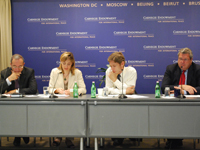Registration
You will receive an email confirming your registration.
Ahead of President Obama's meetings this week with Egyptian President Hosni Mubarak and Jordan's King Abdullah II in anticipation of the upcoming Palestinian–Israeli direct talks, the Carnegie Endowment held a press briefing with Marwan Muasher, vice president for studies at the Carnegie Endowment; Michele Dunne, senior associate at the Carnegie Endowment; Robert Kagan, senior associate at the Carnegie Endowment; and Tom Malinowski, Washington advocacy director for Human Rights Watch. Dunne, Kagan, and Malinowski are members of the Egypt Working Group, a bipartisan group representing a broad range of institutions; they discussed issues relating to succession in Egypt and U.S. policy. Muasher explained why he believes a regional approach is the only viable strategy for the peace process.
The Upcoming Egyptian Elections
- The Succession: The issue of who succeeds Mubarak as president will be critical in defining Egypt’s future. It could ultimately be far more strategically important for the United States than the Middle East peace talks, Kagan said. The U.S. position and posture on succession will also have a major impact within the region.
- Critical Time: Several developments during the past five years make this a particularly important time in Egyptian history, Malinowski said. They include:
- the rise of an a vibrant and critical independent media
- the rise of a credible opposition leader (both domestically and internationally) in Mohammed Elbaradei
- a growing sense among Egyptians that some type of change is inevitable.
- Domestic Focus: Elbaradei, the former head of the International Atomic Energy Agency (IAEA), is Egypt’s first credible opposition leader in decades. However, Dunne explained that he has shown little interest in Egyptian foreign policy issues; indeed, the platform of his National Association for Change has focused specifically on domestic issues.
Egypt and the Peace Process
The United States needs Egypt’s help to conduct peace talks, creating a careful balancing act for U.S. officials between welcoming Egypt’s support and pressuring its government to adopt free and fair elections.
- Open Elections: The next Egyptian elections must be free and fair, Kagan argued. Mubarak will undoubtedly make the argument that he is irreplaceable because of the critical role he can play in the peace process. It is the position of the Working Group, however, that such an argument cannot be used as an excuse for the United States to avoid pressuring the Egyptian government to allow for free, fair, and transparent elections, with international and domestic monitors.
- Discussion Points: Although Mubarak’s visit to the United States will mostly focus on issues related to the peace process, President Obama should discuss Egypt’s decades-old emergency law and the prospect of allowing election monitoring in the November parliamentary elections, agreed the participants.
The United States and Democracy Promotion
Even as several recent developments point to the possibility of significant movement towards increased democracy in Egypt, the Obama administration has lowered its economic assistance for democracy promotion, commented Dunne. Many Egyptian activists believe this is a signal that the United States has become less concerned with democracy in Egypt.
Direct Talks
As direct negotiations between the Israelis and Palestinians begin, it is difficult not to be cynical about the talks, Muasher admitted.
- Not Just Bilateral: The United States must play an active and assertive role in the peace talks because the two parties will be unable to reach a solution on their own. However, Arab participation--particularly from the Saudis and the Syrians—is also critical to ensuring that both parties achieve their minimum requirements for peace. A separate agreement, one that does not include a regional component, is “neither attainable nor desirable,” noted Muasher.
- Israeli Expansion: The continued expansion of settlements into the West Bank geographically limits the possibility of a Palestinian state. If the Israelis continue to expand, their action will undoubtedly end the talks, Muasher argued
A Regional Peace Process
The incremental approach has exhausted its possibilities, Muasher said. Furthermore, the failure to include other Arab states in the talks, who could give Palestinian leaders cover when they have to make hard concessions, has proven ineffective, as evidenced by the failed Camp David talks in 2000. At this point, a regional peace process is the best, perhaps only, way of moving forward toward a two-state solution.
- An Acceptable Offer: The United States will have to offer Arab states an agreement they are both interested in and can accept. For the Syrians, this means that the Israelis will return the Golan Heights to the Syrians. For the Saudis, this means that East Jerusalem will become the capital of the nascent Palestinian state.
- Deposits Encourage Agreement: Saudis and Syrians should not be directly involved in the bilateral talks between the Israelis and Palestinians. Instead, Muasher suggested that they should provide hypothetical “deposits” to demonstrate the efforts they would make if an agreement were reached. These deposits--which could include security assurances from the Syrians, who would pledge to cut off support for Hamas and Hezbollah, and Saudi cover for Palestinian negotiators when making painful compromises on issues like refugees’ right of return--would create incentives that would help prevent negotiations from breaking down when the time came for both parties to make concessions on important issues.
